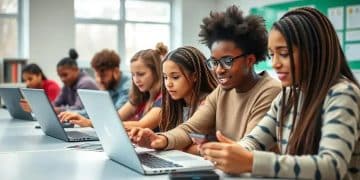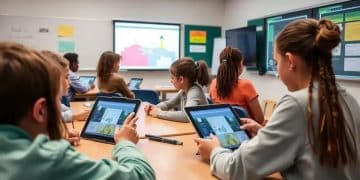Global education trends shaping the future of learning

Anúncios
Future job skills and education strategies require a focus on critical thinking, adaptability, and digital literacy, alongside innovative teaching methods like project-based learning to prepare students for a rapidly changing workforce.
Global education trends are changing the landscape of learning as we know it. With advancements in technology and shifting societal needs, how can these trends shape the way we educate future generations? Let’s dive in.
Anúncios
Emerging technologies in education
Emerging technologies in education are revolutionizing how students learn and teachers instruct. By integrating innovative tools, the learning experience becomes more engaging and effective.
Types of Emerging Technologies
Several types of technologies are making a significant impact in classrooms today. These advancements not only improve the way content is delivered but also how students interact with information and each other.
Anúncios
- Virtual Reality (VR): Provides immersive experiences that simulate real-world scenarios.
- Artificial Intelligence (AI): Offers personalized learning paths, adapting to each student’s needs.
- Gamification: Uses game elements to foster motivation and engagement.
- Augmented Reality (AR): Enhances real-world environments with digital overlays, making learning interactive.
These technologies help create collaborative classrooms where students can explore, create, and learn at their own pace. For instance, virtual reality can transport students to historical events or scientific explorations, making abstract concepts tangible and relatable. Similarly, AI-driven platforms assess students’ weaknesses, providing targeted resources to support their growth.
Moreover, the advent of mobile technology means that learning is no longer confined to the classroom. With access to online resources and applications, students can engage with educational content on-the-go. This flexibility fosters a culture of continuous learning, encouraging students to seek knowledge outside traditional settings.
The Future of Education and Technology
Looking ahead, the integration of emerging technologies is expected to expand. We can anticipate developments like biometrics for assessment, allowing educators to monitor student engagement and emotional responses. Furthermore, innovations in data analytics will enable teachers to design more effective lesson plans tailored to student performance.
As these technologies evolve, they promise to engage students in ways we can only imagine today. The classroom of the future will likely be filled with interactive displays, robotics, and other tech-driven tools that facilitate deeper understanding.
Overall, the fusion of education and technology opens up innumerable possibilities for both students and educators. As we embrace these advancements, we’ll create dynamic learning environments that cater to the diverse needs of every learner.
The impact of online learning
The impact of online learning has been significant, especially in recent years. As education adapts to digital platforms, students and teachers face both challenges and exciting opportunities.
Benefits of Online Learning
Many advantages come with online learning. Students can learn at their own pace, making education more accessible. They have access to a wide variety of resources and materials. This flexibility allows them to engage with content that interests them.
- Convenience: Online classes can be attended from anywhere, removing geographical barriers.
- Diverse Resources: Students can access videos, articles, and interactive content that enrich their learning experience.
- Personalized Learning: Platforms often use algorithms to tailor courses to individual learning styles and needs.
- Time Management: Learners can organize their study schedule, promoting responsibility and self-discipline.
Online learning also fosters a sense of community. Virtual forums and group projects allow students to connect despite physical distances. This helps build relationships and encourages collaboration among peers. Furthermore, educators can incorporate various teaching methods into their online classes, appealing to different learning preferences.
Challenges of Online Learning
Despite its many benefits, online learning also presents challenges. Not every student has equal access to technology or reliable internet service. This digital divide can exacerbate existing inequalities in education.
Additionally, some students struggle with self-motivation when learning from home. They may miss the structure of a traditional classroom, where interactions with teachers and peers help keep them engaged. Teachers need to find innovative ways to encourage participation and maintain a lively classroom environment.
Furthermore, online assessments can raise concerns about academic integrity. Schools must navigate how to ensure fair evaluations while leveraging technology.
As online learning evolves, it will be essential for educators and institutions to address these challenges. By embracing technology and developing strategies to support all students, the future of education can continue to improve.
Customization of learning experiences

Customization of learning experiences is becoming a key trend in education. It allows students to learn in ways that suit their individual needs and preferences. With the rise of technology, personalized learning is not only possible but also effective.
The Importance of Personalized Learning
Every student has a unique learning style. Some may thrive in a visual environment, while others learn better through hands-on activities. Customization helps address these differences by offering tailored content that engages students more effectively. This approach can lead to improved understanding and retention of information.
- Increased Engagement: When students have options that resonate with them, they are more likely to participate actively in their learning.
- Focus on Strengths: Customization allows educators to highlight students’ strengths, fostering confidence and motivation.
- Flexibility: Personalized learning can adapt to each student’s pace, giving them the time they need to master concepts.
- Improved Performance: Tailored learning experiences often result in better academic outcomes, as students can focus on areas where they need more support.
Furthermore, technology plays a vital role in facilitating this customization. Learning platforms and apps can analyze students’ performance data to adjust content accordingly. For example, if a student struggles with a specific topic, the system can provide additional resources to help them understand it better.
Strategies for Customizing Learning Experiences
Educators are adopting various strategies to create customized learning experiences. These may include project-based learning, where students can explore topics of their interest while developing essential skills. Additionally, integrating technology in the classroom, such as adaptive software and online resources, allows for more individualized instruction.
Teachers can also offer choices in assignments, enabling students to select projects that align with their interests and learning styles. This not only makes learning more engaging but also encourages ownership of their educational journey. By fostering a culture of customization, educators can create a more inclusive environment where every student has the opportunity to succeed.
Importance of global perspectives
The importance of global perspectives in education cannot be overstated. Understanding diverse viewpoints helps students develop critical thinking skills and empathy. As the world becomes more interconnected, being aware of global issues prepares students for future challenges.
Enhancing Cultural Awareness
Exposure to different cultures enriches the learning experience. When students learn about worldwide traditions, languages, and histories, they gain insights into how people from various backgrounds think and behave. This cultural awareness can lead to greater tolerance and acceptance among individuals.
- Diverse Learning Materials: Incorporating global literature and resources helps students relate to a broader array of experiences.
- Collaboration with Peers: Working with classmates from different countries fosters teamwork and communication skills.
- Real-World Connections: Learning about global challenges, such as climate change and human rights, allows students to engage meaningfully with current events.
- Global Citizenship: Understanding one’s role in a global community encourages responsible and informed actions.
Moreover, teaching from a global perspective helps students see their studies in a new light. Math, science, and art are not just isolated subjects but are connected to global innovations and historical contexts. For instance, learning about mathematical concepts developed by various cultures can broaden a student’s knowledge base and appreciation for the subject.
Preparing for a Global Workforce
In today’s job market, many employers value individuals who have a global perspective. As businesses expand internationally, they seek employees who can navigate diverse environments. Skills such as multicultural awareness, adaptability, and collaboration are in high demand.
By integrating global perspectives into the curriculum, educators equip students with essential skills for professional success. This preparation not only enhances career readiness but also enriches personal growth. Students who embrace diverse viewpoints can solve problems creatively and work effectively in teams.
In conclusion, emphasizing the importance of global perspectives in education fosters open-mindedness, critical thinking, and empathy. As students learn about the world around them, they become more informed, engaged, and responsible citizens who are ready to contribute positively to society.
Future job skills and education strategies
The future job skills and education strategies are evolving rapidly. With changes in technology and the economy, new approaches to learning are essential. Students must be prepared with skills relevant to tomorrow’s workforce.
Key Skills for the Future
In the coming years, certain skills will be highly valued across industries. These skills not only enhance employability but also contribute to personal growth.
- Critical Thinking: Employers look for individuals who can analyze information and make sound decisions.
- Adaptability: The ability to adjust to new environments and learn new technologies is crucial.
- Collaboration: Working well with others, especially in diverse teams, is increasingly important.
- Digital Literacy: As technology advances, being proficient in digital tools and platforms is necessary.
These skills can be taught through various education strategies that focus on active learning and engagement. Traditional methods alone may not be enough to prepare students for these demands.
Innovative Education Strategies
To equip students for future challenges, educators are implementing innovative strategies within curriculums. Project-based learning encourages creativity and problem-solving. Students work on real-world problems, applying knowledge from different subjects.
Another effective strategy is the use of online platforms. These platforms offer flexibility and a wide range of resources. Students can learn at their own pace, accessing materials that fit their learning style. Incorporating internships and hands-on experiences into education also helps bridge the gap between theoretical knowledge and practical application.
Furthermore, collaboration with industries ensures that educational programs align with workforce needs. By partnering with businesses, schools can design curriculums that provide relevant training and exposure to real job scenarios. This approach can significantly enhance students’ readiness for the job market.
In summary, the landscape of future job skills and education strategies is rapidly changing. By focusing on essential skills and implementing innovative teaching methods, educators can help prepare students for successful careers in an ever-evolving world.
FAQ – Frequently Asked Questions about Future Job Skills and Education Strategies
What are the key skills needed for future jobs?
Key skills include critical thinking, adaptability, teamwork, and digital literacy, essential for navigating the modern workforce.
How can project-based learning help students?
Project-based learning engages students in real-world problems, fostering creativity and practical application of knowledge.
Why are global perspectives important in education?
Global perspectives enhance cultural awareness and empathy, preparing students for a diverse and interconnected world.
What innovative strategies can schools implement?
Schools can adopt online platforms, real-world internships, and collaboration with industries to align education with workforce needs.






